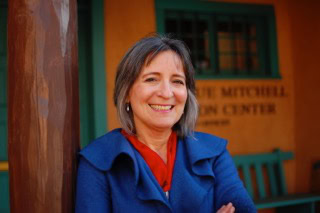Lilian Calles Barger is an independent scholar. She lives in Taos, New Mexico, and has been a member since 2008.
Website: www.lilianbarger.com
Twitter:@LilianBarger
Alma mater: PhD, University of Texas at Dallas, 2014
Fields of interest: US and Latin American intellectual and cultural history, social thought, gender, feminism, religion, and theology
Describe your career path. What led you to where you are today? I entered graduate school in mid-life after a career in business and nonprofit leadership. Prior to graduate school, I wrote two trade books on women and religion and lectured extensively. Having relied on the work of historians for my writing, I realized that I could not reach my intellectual goals without the tools and methods that the study of history provides. Through my lifetime of reading, curiosity about the world, and various intellectual pursuits I understood that organized knowledge is powerful. UT-Dallas had the interdisciplinary program that allowed me to focus on my interest in the history of ideas. In turn, I brought all my previous reading and writing experience to my scholarship.
What do you like the most about where you live and work? Research and writing are my priorities and New Mexico is a beautiful place to do it. As an independent scholar, I have the freedom to pursue my interests and devote time to reading, thinking, and building knowledge. I am aware how much of a privilege this is and therefore I strive to be productive with the hope of making a meaningful contribution.
What projects are you currently working on? Currently, I am revising my book manuscript for Oxford University Press forthcoming in 2018 and tentatively entitled The World Come of Age: Religion, Intellectuals, and the Challenge of Human Liberation. In it, I present a cultural history of ideas that made the emergence of liberation theology possible in the late 1960s. I connect Latin American, black, and feminist theologies in a trans-American intellectual movement. This book emerged from my pre-graduate school cultural engagement and my immigrant experience that has given me a particular perspective on politics and religion in the Americas. I am also revising an essay on the feminist theology that emerged from women’s liberation for an anthology on radical religion, writing a book review for a general audience, organizing an online book roundtable for the Society of US Intellectual History, and preparing for two conference presentations and for upcoming podcasts I am hosting for New Books Network.
Have your interests evolved since graduation? If so, how? Now I have the time to think about what my research and writing means within a larger frame of contemporary society and return to a lifetime intellectual interests put aside during graduate school. I read across a wide range of fields enriching my own work.
What’s the most fascinating thing you’ve ever found at the archives or while doing research? I do not have a particular example. However, I am fascinated with finding that ideas or people that are assumed to be in opposition to each other are often closely related at a foundational level. This motivates my desire to understand the values and aspirations that bind us together as a society.
Is there an article, book, movie, blog etc. that you could recommend to fellow AHA members? There are so many excellent books out there, but I can point to what is on my mind right now. An old personal favorite thinker is the Frenchman, Christian, anarchist, and sociologist Jacque Ellul. He wrote over 50 books with keen sociological insight into the modern world. Currently, I am re-thinking his book Propaganda: The Formation of Men’s Attitudes (1962) that applies to our current age of “fake news.” In works of history that have been published recently, James T. Kloppenberg’s Toward Democracy: The Struggle for Self-Rule in European and American Thought (Oxford Univ. Press, 2016) is truly a lifetime achievement and a must read.
What do you value most about the history discipline? For me writing and reading history is a form of reflective moral inquiry and offers a means to understand why the world is as it is not as we wish it to be. It is not just about facts, people, or events, but meaning formation, a feature that most of the public is unaware of.
Why is membership in the AHA important to you? As an independent scholar staying connected to other historians, finding synergy around common interests, and staying abreast of current scholarship is very important and something I have to seek out. The AHA helps me do that through its many publications and conferences.
AHA members are involved in all fields of history, with wide-ranging specializations, interests, and areas of employment. To recognize our talented and eclectic membership, AHA Today features a regular AHA Member Spotlight series.
This post first appeared on AHA Today.
This work is licensed under a Creative Commons Attribution-NonCommercial-NoDerivatives 4.0 International License. Attribution must provide author name, article title, Perspectives on History, date of publication, and a link to this page. This license applies only to the article, not to text or images used here by permission.



